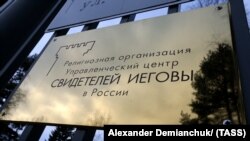Russian authorities suspended the activities of Jehovah’s Witnesses after the nation’s Ministry of Justice demanded that the group be designated an extremist organization and banned.
The ministry reported on its website that since 2009, it has identified 95 materials of "an extremist nature" that were brought into Russia and circulated in the country, according to the Tass news agency.
The ministry accused the Jehovah’s Witnesses of violating Russia’s anti-extremism law by forbidding its members from undergoing doctor-prescribed blood transfusions, and by “propagating exclusiveness.”
Those two alleged violations, according to the ministry, represent a “threat to the society” and qualify as extremist activity, allowing allowing Russia’s legal authorities to ban the Jehovah’s Witnesses.
How accurate are the ministry’s accusations?
The European Court of Human Rights addressed and rejected similar accusations in a 2010 ruling titled “Jehovah’s Witnesses of Moscow and Others v. Russia.”
The court unanimously declared that Russia’s accusations were baseless, and that by prosecuting the Jehovah’s Witnesses, Russia had violated multiple articles of the European Convention on Human Rights.
The Jehovah’s Witnesses World Headquarters communications office told Polygraph.info via email that both accusations are false.
“The European Court confirmed each Witnesses’ personal choice in regard to health care, stating that: ‘…the refusal of blood transfusion was an expression of the free will of the individual community members who exercised their right to personal autonomy in the sphere of health care protected both under the Convention and in Russian law,’” the group’s communications office said.
Responding to the accusation that the Jehovah’s Witnesses group was “propagating exclusiveness,” the statement said: “All religions preach some form of exclusivity - it is the very nature of religious conviction. They all claim to teach the correct ‘truth.’ People do not adhere to a religion unless they believe it to be the ‘right’ religion. Even the Orthodox religions claim to be the ‘correct’ religion, and yet there is no record of an accusation against it for ‘extremist’ activity because of this belief."
Russia’s law “On Countering Extremism” was first adopted in 2002 but has since undergone several revisions, broadening the definition of “extremism.”
Its current version has been the subject of wide domestic and international criticism, for being “specifically designed” to help the government suppress any sort of dissent.
“The anti-extremist law in Russia is essentially designed for selective use, and sometimes it is being arbitrarily used, including against religious minorities,” said Tanya Lokshina, Human Rights Watch’s Moscow-based Russia program director and senior researcher.
Thomas J. Reese, S.J., Chair of the U.S. Commission on International Religious Freedom (USCIRF), said in a statement last week: “The Russian government’s latest actions appear designed to eliminate the legal existence of Jehovah’s Witnesses in Russia.”





